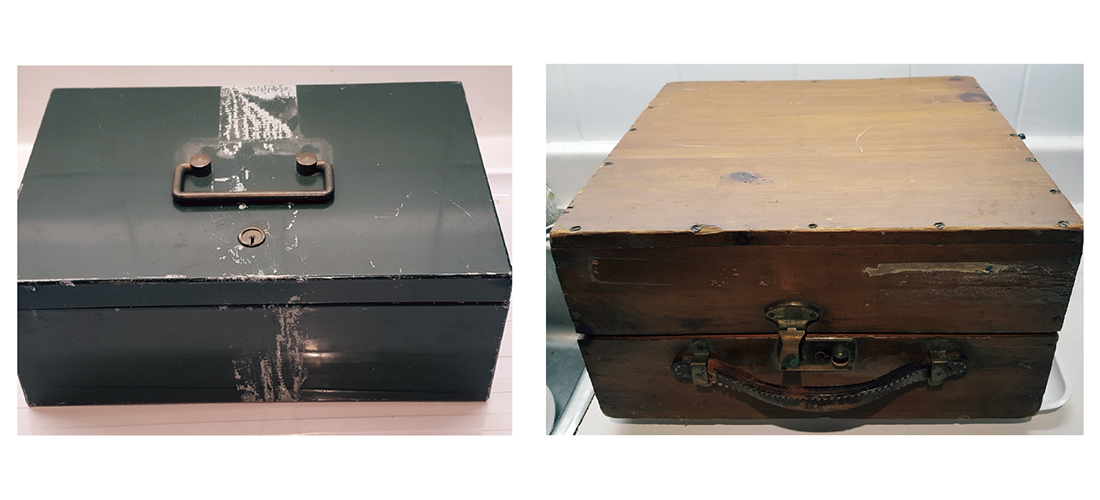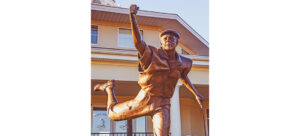
Thinking Inside the Box
The strength in the things that remain
By Deborah Salomon
Generally speaking, I’m not a sentimentalist. I’ve kept hundreds of photos, a drawerful of greeting cards (most handmade), a few documents, certificates, passports, yearbooks and a 100-year-old Egyptian scarab tapestry with an acquisition story rivaling The Bridges of Madison County.
My father saved a trove of World War I memorabilia, including photos taken on the battlefields of France where he drove an ambulance, his dogtags, letters, enlistment and discharge papers. Luckily, one of my grandsons is a history buff. He received them enthusiastically.
Other than that, I don’t hoard mementoes, perhaps because my life has not been storybook. However, at each downsizing I confront two undivestible objects: boxes.
My mother guarded the heavy metal fireproof “lockbox” like a lioness does her cubs. She hid it at the back of a closet often — why I’ll never know — with the key inserted in the lock.
Year after year, she would remind me, “After I’m gone, you’ll find such-and-such in the lockbox.” That such-and-such went beyond the expected insurance info, faded snapshots and birth certificates. She kept checks from closed bank accounts and a zippered autograph book from Woman’s College, Greensboro, 1924. I’m not sure autograph books are still made. Also letters from her father with 3-cent stamps, the discharged mortgage for their house. And a ring, with keys to some unknown kingdoms.
I looked for secrets (or cash) but found none. Neither could I figure out why certain items rated the lockbox while others went into a safety deposit box at the bank.
I became its caretaker in 1991, when my mother sold the house and moved to a retirement center. The sight of that greenish metal lockbox held such gravitas, such reproach that I dared not dispose of it even after she died in 2000. The lockbox, now almost empty, followed me several more moves.
My father’s hobby was woodworking. He excelled at this craft learned at a trade school in Lower Manhattan pre-World War I. He was always making something in his basement shop: big things, like a bookshelf or picnic table, and smaller things like candlesticks turned on a lathe, his most prized possession. I now realize this was his escape, his therapy. When I was small and we lived in an apartment, he used the repair shop at the store where he worked to build a dollhouse (furniture, too) with electric lights, running water in the kitchen sink, wall-to-wall carpet. It was so exquisite I never touched the thing.
He also liked taking movies with his 8mm camera and showing them on his projector. Visitors had to endure watching mini-me sledding down a hill or roller-skating in the park. To store the projector, its attachments and film, he built a compartmentalized wooden case lined in green felt, with a leather handle. Imagine how heavy that box was, fully loaded. Can’t remember exactly when I acquired it — probably when my parents sent a shipment of furniture which I didn’t want from Asheville to Vermont.
Another 20 years passed before I had the degraded film digitized. I tried to give away the projector and camera (but not the case), now a photo buff’s antique, I thought. No takers.
Maybe I should put the lockbox inside the sturdy carrying case (everything my father made was indestructible) and use as a footstool.
Because I could never part with either one. They have a mystical sway I cannot identify.
Few totems or talismans follow an only child of older parents who, totally immersed in their own lives, did not understand the importance of birthday parties or vacations, sleepovers, black patent leather Mary Janes, comic books, bicycles, pets or ice cream sodas at the drugstore. From a distance, other details of the lockbox-home movies era seem disturbing. Perhaps environment stunted my sentimentality. Then why am I so attached to these two empty boxes? Why can’t I take them to Goodwill or put them out for recycling?
Because the bottle found on the beach is as precious as the message secured inside. And because everybody comes from somewhere, rarely empty-handed. PS
Deborah Salomon is a staff writer for PineStraw and The Pilot. She may be reached at debsalomon@nc.rr.com.





